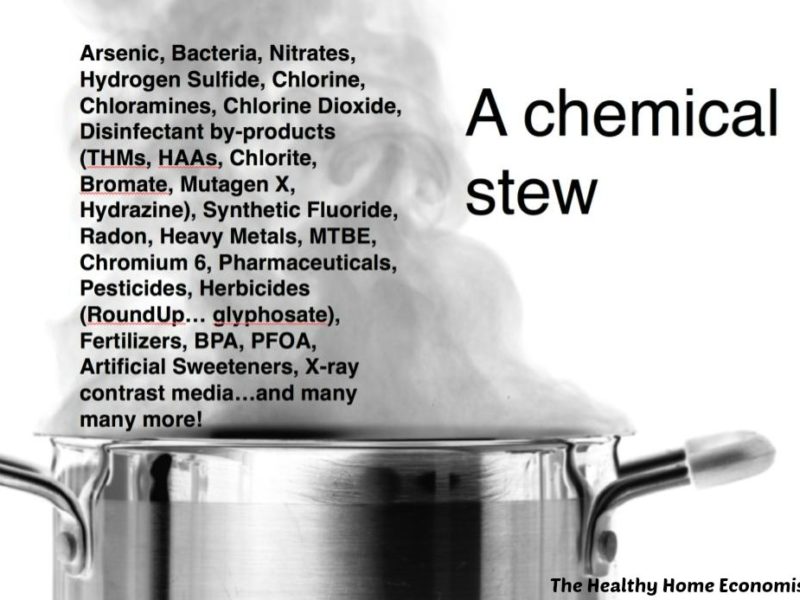The top 5 whole house water filter systems for 2022 and which is best for clean, mineral-rich water for kitchen, laundry, and bathing.

Most of us, whether we choose to acknowledge it or not, are consuming water that contains the residue of treated sewage, industrial waste, agricultural chemicals, pharmaceuticals, heavy metals, fluoride, disinfectants, and their byproducts, as well as storm runoff. Growing awareness of the problem is why more consumers are seeking whole house water filter options.
For those on municipal water, about 80% of Americans, the water is treated in most instances with a variety of chemicals such as disinfectants like chlorine, chloramines, as well as acid neutralizers and more. These chemical disinfectants also cause the creation of disinfection by-products known as trihalomethanes (THMs) and haloacetic acids (HAA).
In addition, most of the country (210 million Americans), now have their municipal water fluoridated without the consent of the homeowner. Fluoride is a nasty chemical derived from the fertilizer industry as a waste product from its manufacturing process. All of these chemicals have been shown to have deleterious health effects including reduced IQ in children.
Wells vs City Water
For those on private well water, like my family, the situation can be even more problematic. Wells are often the source of water contaminated with modern agricultural products including fertilizers, glyphosate-based herbicides like Roundup and pesticides. It can also contain high levels of bacteria such as E-coli, can have excess calcium and magnesium contributing to hard water, rust that discolors laundry and bathrooms, and be very toxic with heavy metals such as arsenic, mercury and more.
That’s the bad news.
The great news is that excellent water filtration technologies do exist today that empower you to take charge and start making your home a better place for you and your family to gain true peace of mind. Some water technologies and solutions are better than others, however!

The best water filter solutions are known as Whole House Water Systems or Point-of-Entry Systems. They are perfectly suited for those looking to address water problems before the water enters the home. Thus, all water is cleaned whether for cooking, drinking, laundry, bathing, or watering the vegetable garden. This means that every faucet in the home (and even outside faucets) delivers clean, safe, great-tasting water!
5 Whole House Water Filter Options
Following is a discussion of the various whole house water filtration choices available to you today including the advantages and disadvantages of each. The best option is discussed at the end.
Sediment Filters
A budget-friendly unit that most homes would benefit from as it physically removes particulates from the water before entering your home’s plumbing.
Advantages: Inexpensive and easy to install for those with lots of sand, silt or dirt in their water.
Disadvantages: Ineffective in removing chemicals, bad taste, odor or any other contaminants.
Softeners
For those homes with hard water, a salt-based softener can mitigate the effects. However, these systems are limited in that they do not provide any removal or filtration of chemical contaminants. Many people find a water conditioner to be superior to a softener because a conditioner requires no salt, no backwashing, no electricity, and no maintenance.
Advantages: Both softeners and conditioners are effective in addressing concerns with high levels of water hardness caused by excesses in calcium, magnesium or iron.
Disadvantages: Softeners are ineffective in removing chemicals, bad taste or odor. They can contribute to high levels of sodium or potassium to the water. They also require regular maintenance.
Granular Activated Carbon Filter
A basic, entry-level whole house water system utilizing a single type of filtration media.
Advantages: Effective in removing chlorine and chlorine byproducts as well as eliminating bad taste and odor.
Disadvantages: Ineffective in removing many chemicals including chloramines and fluoride. It does not lessen the effects of heavy metals.
Reverse Osmosis (RO) System
RO Systems purify water through multiple stages usually including sediment filtration, ultraviolet light, deionization and the use of pre- and post-carbon filters in conjunction with the use of a reverse osmosis membrane.
Advantages: Effective in removing a wide spectrum of contaminants to produce very pure water.
Disadvantages: Very expensive. It requires lots of space. Wastes water. Takes out valuable minerals. Not optimal for fermentation or making kombucha or water kefir.
Mixed Media Filtration System (BEST Whole House Water Filter)
A mixed media whole house system utilizes a blend of highly effective and well-tested types of water filtration media typically formulated within a single cylindrical tank. It connects directly to the incoming plumbing to affect the entirety of your home’s water.
This whole house system is my vetted pick for the best quality!
For those also looking for the optimal in kitchen water purification, you would pair the whole house water filter with this biocompatible purification system.
Advantages: Effective in removing chlorine, chlorine by-products, heavy metals, fluoride, and bad taste and odor, all within a single tank. It can be customized to address special issues with well water. It will last for many years (up to 1,000,000 gallons) and is maintenance-free.
Disadvantages: More of an investment but well worth it in the long run especially since it is maintenance-free.
Do You Have a Whole House Water Filter Yet?
What are your water concerns based on the area you live? Have you installed a whole house water system yet? Is your water fluoridated? Are you concerned about pharma drugs and gut destroying glyphosate residues in your water like I am? What’s your story?








I have used RO water for all my water kefir and kombucha. I have seen no problem with this. What is the problem in your opinion?
Because the water is devoid of trace minerals, it weakens the culture over time and eventually the culture doesn’t work very well or at all.
Are you familiar with the RO systems used by Culligan. How does this compare to the Radiant Life system? We have well water with a softener and sediment filter. Been using poland spring 5g bottles for drinking and now looking to replace that with a RO system. Any thoughts would be greatly appreciated. We are big time water drinkers with family of 5. Thanks!
I’ve been wanting to update my home’s water filtration and I didn’t realize that there are so many contaminants that can get through without one. It makes sense that things such as E-coli and excess calcium can be in an unfiltered home causing serious health concerns and maintenance issues. This is something to keep in mind because getting a whole house system could help me feel much more comfortable using the tap and shower.
I have my own well and find it confusing when searching out a filtration system to use for whole house. I don’t need to filter out chlorine or fluoride. My concern is agricultural chemicals, arsenic and coliforms. My water also has lots of stain causing iron and minerals. The systems I see always have tanks to filter out things we don’t have in my water, so I feel like none of them focuses on well water problems. Well water is an after thought.. Which system do you suggest that would be specific to well water without wasting money on unnecessary filters geared towards municipal water?
Could you write an article about how to get unfluoridated water for people who live in apartments or townhouses in the city or suburban areas?
Fluoride is VERY difficult to get out of city water. You either need a very expensive RO system or buy bottled spring water (in glass bottles).
The biocompatible purification system you reference, do you consider that RO?
those concentrated mineral drops sounds interesting what is it calledand how to get them and is it safe?I live in Australia gope I could get some too.also can you tell me the name of the best water filter and what is the best shower filter.for England showers is there one for universal head?fluride enters the body thru showers as well.
I agree, it is not ideal but Berkey does give great drinking and cooking water and is a good idea for people who simply can’t afford a whole house system or who rent.
We bought the Berkey as did our friends. We all returned it. The water tasted like chemical soup and the machine off gassed chemical odors from a rubber base.
Hello Sarah! This is something that has definitely been wearing on my mind lately. I want to know that we are doing the best we can with our water consumption and chemical avoidance. Our water is probably better mineralized than most as it comes right off the mountains we live by here in (very) rural Montana but it is chlorinated before it reaches us. We have a whole house sediment filter, a water softener, a RO at the kitchen sink, as well as a Berkey (I prefer the taste over the RO), and use chlorine filters in our shower/bath tubs. Everything we drink we add Concentrace Mineral drops to help with the overall depletion of minerals in our water system. When we need water for camping, etc. we use a local spring that only uses O3 and sediment filters to treat their water to preserve mineral content. With all that we have already invested, I don’t think a Mixed Media System is in the budget… So with the exception of that, what are your thoughts on how we are doing at this point? Is there something I am missing or am just uneducated on the quality of that we could correct? I appreciate your posts!
Sounds like you have put a great deal of thought into the water in your home and doing a great job! I am honestly not sure yet how I feel about Concentrace Mineral drops … I haven’t researched them deeply enough to form an opinion one way or the other. Something I need to look into, but we don’t have RO water in our home, so I just haven’t done it yet 🙂